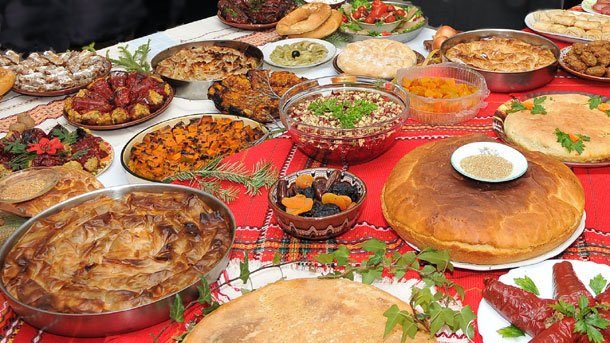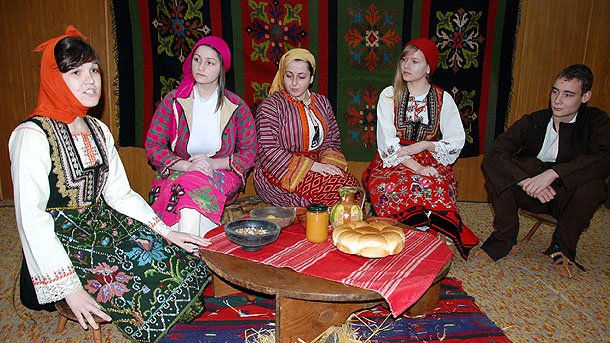The Bulgarian traditional calendar features a string of dates for important family occasions. They go across all seasons and the implication is that we should always keep in touch with the family. The biggest family occasion for the year however is Budni Vecher or Christmas Eve, a celebration with a history of more than a thousand years in the Bulgarian lands. Folk Studio written by Albena Bezovska highlights ancient rituals and present-day traditions on Christmas Eve.

© Photo: BТА
The Nativity of Christ (Christmas) is the most important holiday for Catholics and Protestants. Orthodox Christians who tend to give precedence to the Resurrection of Christ (Easter) celebrate Christmas with all its rich symbolism. Both Christmas and Easter are preceded by long fasting – the Advent and the Long Lent respectively. The precise day of the Nativity of Christ is not known, and the celebration had no fixed date in the calendar until 6 c. when the Church accepted the date 25 December. In fact it sought to replace ancient Asia Minor cults marked on the same day. Long before Christianity was adopted in the Bulgarian lands, our forefathers celebrated the birth of the new sun in the days surrounding the winter solstice. Later the celebration was called Mlada Boga (Young God). This meant the infant Jesus, and the day was chosen to pay respect to the magic of nativity. The pagan roots of this tradition have not weakened to this day. The present-day style of celebrating the day provides enough evidence of that, and especially the table that should be richly laid on Christmas Eve. And full of symbolism too. Most rituals are dedicated to the family. Central to them is a prayer for health and wellbeing.
It is quite amazing that in 21 c. we still single out the Bulgarian Christmas Eve for the odd number of dishes served, all of them strictly vegan – boiled wheat, boiled beans, cabbage leaves stuffed with rice, pumpkin pie, boiled dried fruit, garlic, honey and walnuts. To them salt, warmed up brandy and red wine are traditionally added. And of course, the highlight at the table is a round loaf of bread with a coin hidden inside.
In the past women began to prepare for the special night starting very early in the morning, and the same consequence of preparations was observed every year. Kneading the dough for the bread was entrusted to a young, still unengaged girl, so as to keep fertility at home. The girl would only stir part of the flour and add some leaven, i.e. she was meant to put the start to the process.

© Photo: BТА
Bread was, and still is a very important part of traditional holidays. For Christmas Eve the ritual round loaf of bread, the center of the meal, was decorated with stylized flowers, birds and suns. In some regions of Bulgaria the decoration included the figures of a plough, a ploughman, a shepherd etc. Apart from that loaf, various buns were made to give away to the carol-singers. The group of male carol-singers started their tour of the village in the first hours of the new day. As they stopped at every house to bless the household, they were given ring-shaped buns everywhere.
Various practices have originated in Bulgaria related to the veneration of bread as the foremost symbol of life. In some regions of the country women performed the following rite: after kneading the bread, with dough still sticking on their fingers, they went out in the yard and started touching trees for the sake of a bigger harvest, and young wives who had difficulty conceiving, for the sake of many children born.
Early in the morning before Christmas Eve men were busy too. They had the prepare the yule-log, or Budnik, that should go on burning in the hearth all night. They went out at daybreak to cut the tree for the yule-log. A hole was made in the wide part of the log and incense and oil were put inside it. Today, the flame is still the symbol of this magic night, however it is present in the lighted candles and the fireworks that begin at midnight.

© Photo: BGNES
The cleansing power of fire, the life-giving energy of bread, the symbolic presence of everything needed for the festive table – we have inherited all this from the older generations and will repeat the same rites this year too. And we will gather for a Christmas Eve meal with children, grandchildren, parents, grandparents and friends, with everybody who’s got a special place in our hearts.
Translated by Daniela Konstantinova
All Bulgarian masquerade games originate from the ancient rituals related to the birth of the sun around Christmas. With the adoption of Christianity, in order not to defile the newborn God, the custom was blurred. In the western..
The Roma community in Bulgaria is celebrating Vasilyevden /or Vasilitsa, Bango Vasili (literally the Lame Vasil)/, also known as the Roma New Year , reports the Amalipe Foundation. The Roma New Year combining in its traditions Christmas with St...
Today is Babinden (Midwives' Day) - one of the most beloved and authentic Bulgarian holidays deeply rooted in local folk tradition . Celebrated on 8 January in the new style calendar and January 21 in the old style, it is dedicated to the women who used..
All Bulgarian masquerade games originate from the ancient rituals related to the birth of the sun around Christmas. With the adoption..

+359 2 9336 661
